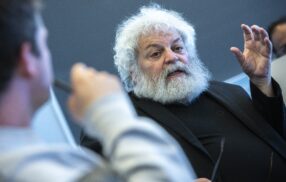Leadership Unscripted: The Smart Strategy at the Heart of ESG
By David Hendrick
Environmental, Social and Governance practices hit the mainstream in recent years, with commitments to sustainable, stakeholder-minded practices increasingly a core component of corporate strategy.
The mainstreaming of ESG has lately been accompanied by a backlash, with congressional legislation aimed at blocking consideration of ESG issues in investment decisions recently passing both houses of the U.S. Congress, before ultimately being vetoed by President Joe Biden.
For Duke Energy Chief Sustainability & Philanthropy Officer Katherine Neebe (MBA ‘04), who has worked in the space for more than two decades, the conversations around ESG can obscure what is a relatively straightforward orientation.
“Fundamentally, I think of it as a strategic question for enterprises,” Neebe said at a Leadership Unscripted event at UVA Darden DC Metro. “The strategy comes from asking, ‘What are the environmental and social factors that are a risk for the business and its stakeholders, and then also where can the company add value and create a positive difference, a competitive advantage, on these issues.”
Neebe, who was in conversation with University of Virginia Darden School of Business Professor Allison Elias, said she typically leaves out the G when talking about the space, as effective governance is foundational to a company’s performance.
The Darden graduate, who previously served as head of ESG strategy for Walmart and as manager of business and industry for the World Wildlife Fund, has had a front-row seat as the space matured, with what was at one time commonly referred to as “corporate social responsibility” going from a “nice thing to do,” to a world where ESG is increasingly seen as a business imperative.
For example, at Duke Energy, Neebe said the company’s “business strategy is our climate strategy.” Over the next decade, the company plans to spend about $145 billion on a clean energy transformation, with about 85 percent earmarked toward clean investments, in route to hitting net zero carbon emissions by 2050. In the near term, these investments include a focus on grid modernization which enables a smarter and more resilient energy system capable of handling the new wave of distributed generation and electrification as well as infrastructure projects, such as solar, wind and battery storage.
The investments are taking place in a heavily regulated industry with a mandate to provide reliable energy at the least possible cost to consumers. In other words, Neebe said, the company isn’t putting the E at the forefront of its strategy for optics, or to placate a vocal group of stakeholders; it is doing so because it believes it to be the prudent path forward. The company says a 10-year plan will support $250 billion in economic output throughout its territory, Neebe said.
Additionally, the company’s research suggests that when employees are informed about the company’s ESG strategy, engagement strengthens.
“When I was younger I would roll my eyes whenever anyone introduced corporate purpose, but as I’ve gotten older and deeper in my career, I’ve come to realize how important corporate purpose and corporate mission is in really galvanizing an entire organization behind a common and shared objective,” said Neebe.
While the industry has matured considerably in recent years, there is no single agreed-upon metric or measurement by which to effectively track ESG, which can make the work difficult for some stakeholders to effectively assess. The lack of consistency across industries on inputs and outputs can open up ESG to criticism from both sides of the political aisle.
Neebe described an ESG approach as eminently defensible, and, when pressed on the issue, emphasizes the “business fundamentals” underpinning the approach, asking “What is advancing the business, what is mitigating risk and where are your stakeholders when it comes to these issues?”
Posing those questions allows a company to make “much more sound decisions” when it comes to navigating the terrain. At Duke Energy, making ESG-focused decisions furthers the corporation’s core function, she said, which is providing “reliable, affordable, increasingly clean and accessible energy to our customers.”
Neebe encouraged students interested in the space to approach the space with humility, to truly listen to stakeholders, and to approach their work with the idea that people generally want to do “the right thing.”
Listen to a Podcast of the Event
The University of Virginia Darden School of Business prepares responsible global leaders through unparalleled transformational learning experiences. Darden’s graduate degree programs (MBA, MSBA and Ph.D.) and Executive Education & Lifelong Learning programs offered by the Darden School Foundation set the stage for a lifetime of career advancement and impact. Darden’s top-ranked faculty, renowned for teaching excellence, inspires and shapes modern business leadership worldwide through research, thought leadership and business publishing. Darden has Grounds in Charlottesville, Virginia, and the Washington, D.C., area and a global community that includes 18,000 alumni in 90 countries. Darden was established in 1955 at the University of Virginia, a top public university founded by Thomas Jefferson in 1819 in Charlottesville, Virginia.
Press Contact
Molly Mitchell
Associate Director of Content Marketing and Social Media
Darden School of Business
University of Virginia
MitchellM@darden.virginia.edu




